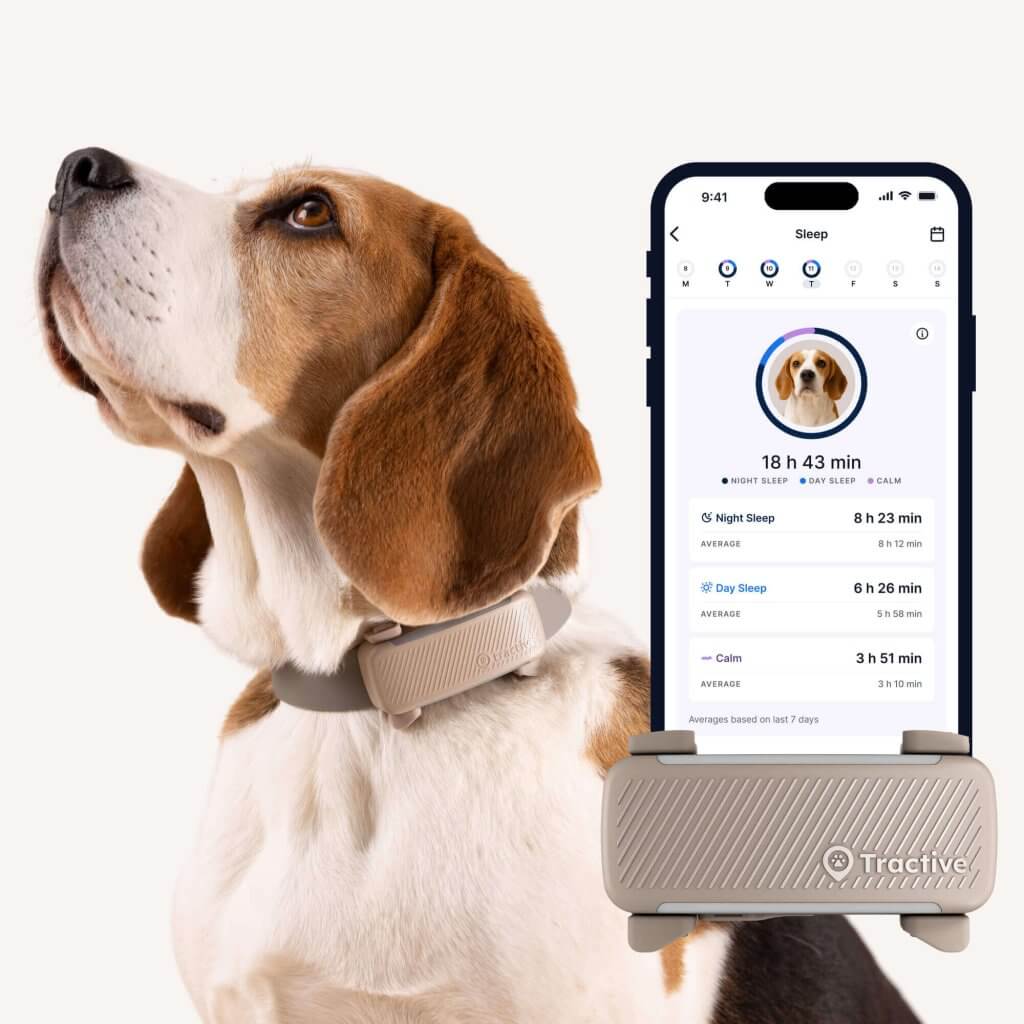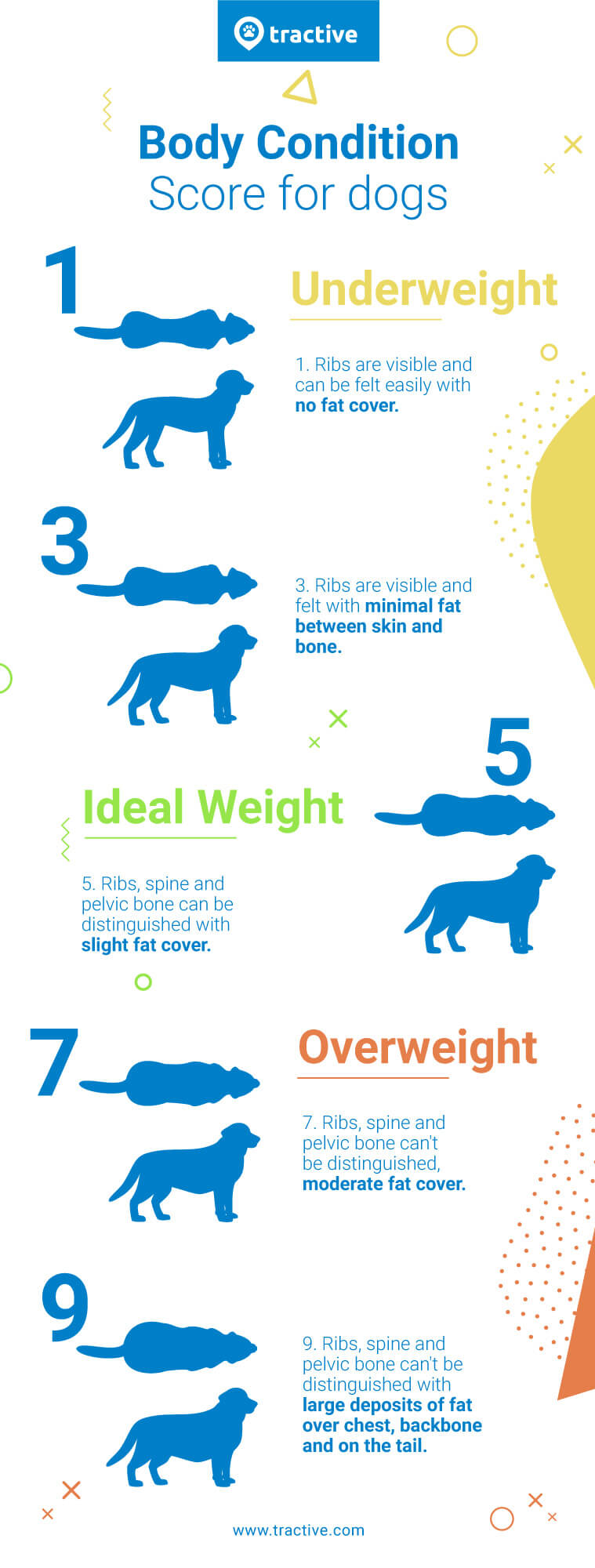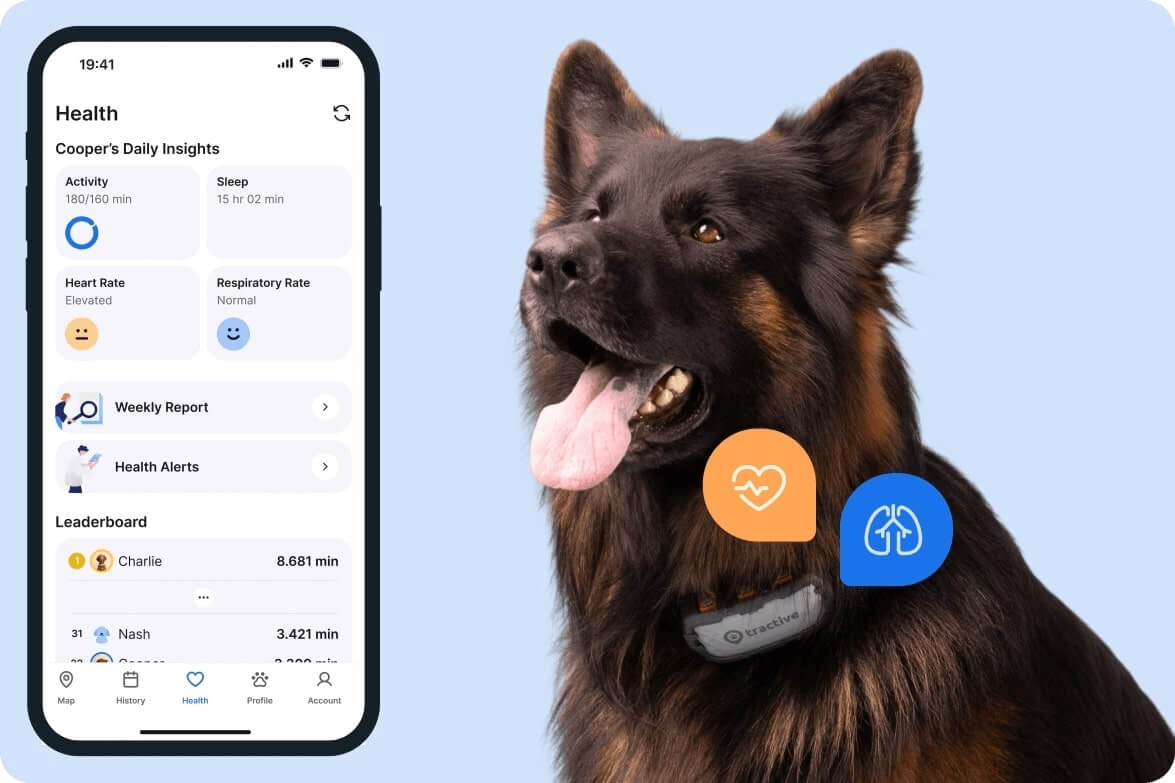 Approved by Dr. Dwight Alleyne, DVM
Approved by Dr. Dwight Alleyne, DVM What Makes Dogs Fat? Getting An Overweight Dog Back In Shape
Let's admit it - chonky dogs can be kinda cute. But in the long run, being overweight makes your dog more vulnerable to dangerous and even life-threatening diseases. So here are some of the most common reasons why dogs get fat & what you can do about it.

Over 50% of dogs in the US alone are overweight.1 Sadly, with time, it can have a terrible impact on your buddy’s long-term health, happiness, and quality of life by your side. So in this post, we’re going to help you understand why dogs become overweight – and how tracking their daily activity can help you get them back in shape.
Key Takeaways
Weight gain can lead to serious health issues.
Overweight dogs are more at risk for health problems like arthritis and diabetes. With time, those extra pounds can shorten your dog’s lifespan.
The causes of weight gain are varied.
Your dog could be gaining weight due to an inappropriate diet (too many treats). Other causes include a lack of exercise, or underlying medical conditions like hypothyroidism.
Proper diet and exercise are key.
Make sure to follow your vet’s instructions, use a food scale, don’t skip the daily walks, and weigh your dog regularly.
A Tractive smart dog tracker can help you.
Strapped to your dog’s collar, your Tractive device helps you track your dog’s daily activity, track calories, and identify any changes in their activity level that could signal a health issue.

Always know your buddy is healthy & safe
Read moreWhat kind of health problems do overweight dogs have?
Dogs that are overweight are at higher risk of these potentially serious health conditions:
- arthritis
- diabetes
- breathing difficulties, including sleep apnea
- respiratory disease
- cancer
- high blood pressure
- joint injuries
Which means even those extra table scraps (and the resulting weight gain) can come at a cost. Overweight dogs’ health is inherently compromised – along with their quality of life. Because much like humans, dogs who put on more weight experience more pressure on almost all their organs. Overloaded organs can cause disease, and even lead to death. Overweight dogs will likely have a shorter lifespan than their fellow four-legged friends. That’s why it’s important to understand if your dog is overweight, which factors may have led to this, and how you can help your dog lose weight and regain full health.
💡A Tractive smart dog tracker can help you pick up on whether they’re getting enough exercise or have gotten more sedentary over time. From the mobile app, you can check how many calories they’ve burned – so you can even portion their food servings accordingly.

Help your dog stay fit and healthy
Get a complete overview of how much exercise and rest they’re getting. Compare their activity to that of similar dogs. Set daily goals. And find out if something might be off with Health Alerts.
How can I tell if my dog is overweight?
There are several ways to check if your dog is overweight. If you can no longer feel your dog’s ribs when you touch their chest, this is a good sign that your dog is overweight, or maybe even obese. You can also use the Body Condition Score Chart below or our dog BMI (body mass index) calculator to check if your dog’s weight falls within a healthy range.
Finally, your vet will be able to tell if you if your dog is overweight, how much they should ideally weigh, and recommend a plan for weight loss that is specific to your dog’s needs.
Body Condition Score Chart for overweight dogs
Use the Body Condition Score chart for dogs below to see if your dog is undernourished, at an ideal weight, or overweight. This is what vets consider the best way to evaluate a dog’s weight.

If your dog is considered overweight – it’s time to understand what may have caused that so that you can take steps to make their life better.
What makes dogs fat?
- Inappropriate food & diet
Feeding an adult dog high-calorie puppy food or giving them human foods or extra treats can all lead to weight gain over time. - Lack of exercise
Big or small, young or old – dogs need to exercise daily. So consider taking your dog along with you when out on a run or try a gentle hiking trail together. Your dog will benefit tremendously from the exercise – but also the sensory stimulation of being out in nature. - Breed disposition
Some dog breeds are more likely to end up overweight, including Cocker Spaniels, Cairn terriers, Retrievers, Beagles, Basset Hounds, and brachycephalic dog breeds like Pugs, Staffies, and Bulldogs. - Habits & routine
Dogs are smart cookies. They can learn pretty quickly that the puppy eyes gets them treats from Grandma or that one uncle, so they’re likely to repeat this behavior (and end up gaining weight.) - Age
Your senior dog might need fewer calories than a young adult dog. (Because they’re less active.) But if they eat just as much as they used to, senior dogs might gain weight fast. - Neutering
Sex hormones control the appetite and metabolism of pets. If neutering limits the effect of these hormones, it can lead to an excessive appetite and lower energy. Neutering might also change your pet’s feeding patterns, making your dog beg for more food.
Medical conditions that can make dogs overweight
- Hypothyroidism
An under-active thyroid gland can lead to lowered hormone production. Like we’ve mentioned, some dogs (like Scottish terriers) may be predisposed towards hormonal conditions like hypothyroidism. Which can put a damper on their energy and make them more likely to laze around over joining playtime. - Cushing’s disease
Or when a dog’s adrenal glands may produce too much of a hormone called cortisol. Dogs with Cushing’s Disease don’t actually gain weight. But their fat is redistributed to the abdomen, giving them a pot-bellied look.
How can I help an overweight dog lose weight?
There’s a lot you can do to ensure your pup lives a healthy, happy life. Here are our top tips for how you can help your dog lose weight:
Gradually change your dog’s diet
Helping an overweight dog get back in shape doesn’t need an extreme diet. These tend to not be the most sustainable – and a big change might just stress your dog out. So go slow and steady – one step at a time.
- Use a food scale to know exactly how much they’re going to eat.
- Replace snacks with healthier options. If your dog has picked up the habit of grazing on treats throughout the day, they’ll protest if you suddenly cut these off completely. So opt for healthy snacks like kibble instead.
- Keep a limit on the treats. Mix them up by rewarding your dog with pets, praise, or extra playtime. So they don’t start “behaving” only for the prospect of extra snacks.
- Follow a vet-approved calorie-restricted diet. Make sure to start gradually to get your dog used to “fewer” calories over time – and make sure they’re getting just a bit more exercise than usual. (To ensure they’re in a calorie deficit.)
Make regular exercise a priority
Regular walks outdoors isn’t just a fun, bonding activity. Rather, some countries (like Germany) might even make it a legal requirement to walk your dog twice a day! So make sure to check in with your vet the recommended number of walks with your dog. Or what indoor and outdoor playtime activities you can get up to together. Other small hacks include moving your dog’s feeding bowl upstairs – just to get them a few more steps.
Read more: How to tire out a puppy
Besides that, consider getting your dog an exercise buddy. (Whether you or a loved one with a dog.) It’ll help both you and your dog socialize, as well as keep you accountable and motivated to their daily exercise.
Stay on top of your vet visits
Looping in your local vet can help you rule out the possibility of a medical condition. If you notice your dog panting, limping, or generally finding it more difficult to move, get in touch with them immediately. Your vet can also advise you what supplements you could add to your dog’s diet to make weight loss easier.
Use a smart dog tracker to stay motivated
It can be difficult relying on memory alone when you’re describing your dog’s everyday habits. But with their Health Monitoring data at hand, you’re more likely to have a productive conversation with your vet.

With its built-in motion detector, your trusty Tractive device helps you figure out:
- How much activity your dog gets throughout the day (their “active minutes”)
- How many calories your dog has burned throughout the day from exercise (so you can adjust their food portions accordingly)
- And whether there’s any weird change in your dog’s activity, like a drop in their active minutes (which could signal they might be sick)
💡It’s how Tractive pet parents around the world – just like you – are monitoring their buddies’ health with our lifesaving technology. And helping them live a longer, happier, healthier life together.
Your furry friend’s health and wellbeing means as much as to us as it does to you. So we’ve made it a priority to only share medically-relevant content on our blog. This post was checked, double-checked, and medically verified by Georgia-based vet, Dr. Dwight Alleyne.

Dr. Dwight Alleyne, DVM
Originally from Long Island, New York, Dr. Alleyne began his career at a no-kill animal shelter before becoming a licensed veterinary technician. He graduated from Cornell University Veterinary College in 2006 and completed an internship at Purdue University. Now practicing in Georgia, Dr. Alleyne specializes in soft tissue surgery and ultrasounds. He also writes pet health articles on his website, “The Animal Doctor Blog” (www.anmldrblog.com).
Tractive is not a medical device. While Tractive monitors trends and patterns in your pet’s well-being, it is not intended to diagnose health conditions. We recommend always seeking medical advice from a vet.



